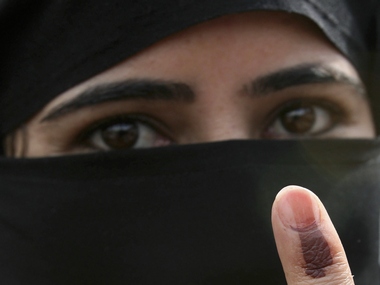Lucknow: First Salman Khurshid and now Beni Prasad Verma. The Congress’ desperation shows. It seems to have either lost the plot when it comes to Muslim votes or is grappling with new realities in the Muslim space — which no more conform to the accepted stereotype when it comes to voting. Earlier, it only had to compete with the Samajwadi Party, now there are others who are equally strong. Besides the BSP, there’s the Peace Party, which is gaining in popularity in a section of the community. The Pasmanda factor has emerged strongly this election and it threatens to upset all calculations of parties. The Pasmandas are the backward section among the Muslims, consisting of Ajlafs and Arzals, whose social and economic status is more or less similar to Dalits and MBCs. Ajlafs consist of Hindu converts from backward castes and Azrals are converts from untouchable communities. They — kunjra (vegetable sellers), dhunia (cotton workers), kalal (alcohol distillers), julaha (weavers) — constitute more than 80 percent of the Muslim community, hence a big chunk of voters. Their grouse is against Ashrafs, the highborn Muslims, who they claim have cornered all benefits meant for the community. The Ashrafs, they allege, have managed to secure adequate representation for themselves in representative institutions and in jobs. They are economically well off too. The Pasmandas believe that this rich lot has blocked every scope of their social, economic and political upward mobility. [caption id=“attachment_216529” align=“alignleft” width=“380” caption=“The Pasmandas — the backward section among the Muslims — has emerged strongly this election and it threatens to upset all calculations of parties. Reuters”]  [/caption] The Peace Party of Dr Ayub Ansari, a new entrant in the state’s political arena, is articulating the concerns of this group and has tasted some success in organising them into a vote bank. Poll analysts here believe the actual contest for these votes will be between the Samajwadi Party and the Peace Party. That is what makes the Congress jittery. And it explains why it is so loud about the 4.5 percent quota within the OBC quota for the backward Muslims. “The Muslims won’t vote for the BJP. That leaves three secular parties – the BSP, the SP and the Congress. The community’s first choice is the SP. The BSP has not done much for the Muslims but it has not harmed them either. There has been no major communal riot in her regime. So people are not averse to her,” said an influential member of the community who did not want to be named. “They don’t find the Congress trustworthy. With no communal polarisation right now, it is a three-way race. But the Peace Party can play the role of spoiler by taking away a chunk of Pasmanda votes,’’ he said. The BSP’s Dalit empowerment policy has a ripple effect on the Pasmandas. They now want equality and opportunities similar to Dalits in their own community. The Peace Party is catering to that aspiration. Interestingly, Ayub’s party does not position itself as a conventional Muslim party, catering to the community only. It is looking to establish itself as a mainstream party with Muslims in leadership positions in the organisation. “He is following the model Kanshiram developed for the BSP. He does not have a hardline position and his candidates represent all shades of the society, including Brahmins, Thakurs and Valmikis. The BSP’s core vote base is the Dalits and it offers seats to other castes in a strategic arrangement where Dalit votes in a seat are transferred en bloc to the party candidate from other communities. The Peace Party is working on a similar formula,’’ says Uttkarsh Sinha, senior journalist. The party has announced 230 candidates and entered into alliances with regional outfits like the Buldelkhand Congress Party and Apna Dal. This makes it a pan-Uttar Pradesh party rather than an Eastern UP party, where it is based right now. Poll analysts are of the opinion that the Peace Party won’t more than 30 seats but it will certainly cause damage to big parties around. “The SP might suffer big time if the Peace Party causes division in its Muslim votes. In that case its advantage vis-a-vis Congress will get nullified,’’ says an expert. Are we set to witness a Pasamanda movement on the lines of the Dalit movement? It is possible. “The Peace Party wants to grow horizontally and is in no hurry. Ayub is a level-headed man and he knows how to make his moves. By the next election, his party could be a force to reckon with in Uttar Pradesh,’’ the expert adds. All big parties certainly have reason to be wary of this new ‘P’ factor.
The Peace Party may not win too many seats but it will certainly upset poll calculation of parties.
Advertisement
End of Article


)
)
)
)
)
)
)
)
)



